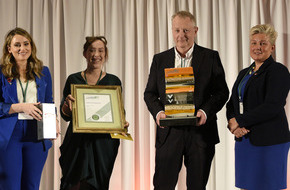Highlights
- 50% of Highlands Rewilding’s electricity is produced by solar and wind power and there are plans underway to be fully self-sufficient in this area.
- Restoring peatlands bringing benefit to biodiversity and carbon removal - the Bunloit Estate will sequester as much CO2 as it can going forward, based on its ongoing front-line scientific research.
- Community engagement is central to the approach; they will use crowdfunding style shares to support Scottish people to co-own land purposed for rewilding within Scotland and work closely with community groups.
- Chosen as a case study for University of Oxford’s Leverhulme Centre for Nature Recovery – which will investigate how to halt and reverse ongoing nature and biodiversity loss, and how to implement and finance nature recovery that is scalable, effective, and socially just.

Highlands Rewilding Ltd, based in Drumnadrochit, is a company aiming to help rewild and re-people the Scottish Highlands by increasing carbon sequestration, growing biodiversity, creating new green jobs and generating sustainable profit for purpose. This work is carried out across their two estates, Bunloit Estate and Beldorney Estate.
Highlands Rewilding Ltd have a wide vision to create an east to west corridor of rewilded native woodland called Affric Highlands (in partnership with Trees for Life and other landowners) to make a woodland corridor from Glen Affric to Loch Ness. Bunloit Estate is expected to sequester almost 61,000 tonnes of CO2 emissions over the next 100 years.
The Adapting Scotland award recognises businesses and partnerships that are taking a visionary approach to climate adaptation. Highland Rewilding won this category by trialling an exemplar rewilding business model, providing scalable land management which boosts biodiversity and carbon sequestration while supporting local, rural communities, and offering other landowners assistance to do the same.
There have plans to become part of a multi-landowner co-ordinated effort of riparian planting along the River Deveron which will act as a form of natural flood management system in a climatically uncertain future. The trees from this will also shade the water, reducing evaporation and cooling the water, which will allow greater fish survival during hotter summers. This model of rewilding being trialed in the Scottish
Highlands may be replicable in many ways across the world, including areas where communities are most
affected by climate change.
Community involvement is crucial to their success, and schools have access to the land as an open-air biology classroom to help teach rural skills to high school students. Local job opportunities, including an apprenticeship, have been created. Crowdfunding style shares will open to the public in 2022 – allowing Scottish people to co-own land purposed for rewilding within Scotland.
Producing 50% of their own electricity from renewable power saves thousands of pounds in electric costs. Highlands Rewilding are gaining custom for natural capital credits. The eco buildings and sustainable agriculture will also contribute to profitability. Highlands Rewilding is working to be of real and substantive benefit to conservation, biodiversity, the climate and the local community.
The judges were impressed by the potential of the project to help adapt to climate changes and potential for replicability.
“We are proud to have been recognised at this year’s VIBES Scottish Environment Business Awards as the winner of the Adapting Scotland award. It is a real testament to the hard work and commitment from everyone at Highlands Rewilding Ltd.”
“The Awards are a fantastic way to find out about what other businesses are doing. You can share best practice amongst a like-minded community who also want to improve their operations whilst benefitting the environment. It is a great opportunity to inspire others to follow suit.” Jeremy Leggett, CEO of Highlands Rewilding